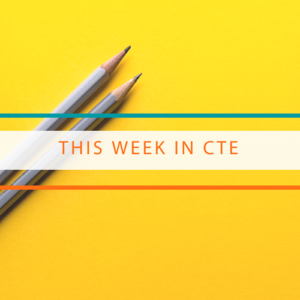TWEET OF THE WEEK
First ever Kindergarten Kareer Day. @GCHSPirates CTE students shared career opportunities in Agriculture, Construction and Welding. What a great day for everyone! @GCHSPirates @IvyTechCC @NationalFFA @KoenigEquip @CTEWorks @GreensburgElem pic.twitter.com/n7L4vRBFEF
— Greensburg FFA/AgEd (@GreensburgFFA) April 30, 2019
 ANNOUNCEMENT OF THE WEEK
ANNOUNCEMENT OF THE WEEK
House Appropriations Subcommittee Marks Up Spending Bill for Education, Labor Programs
On Tuesday, April 30, the House Appropriations Subcommittee on Labor, Health and Human Services, Education, and Related Agencies marked up their appropriations bill for Fiscal Year 2020, which begins October 1, 2019. The bill passed out of the subcommittee on a voice vote.
Overall, the bill included a six percent increase for federal education programs and a 10 percent increase for labor programs above the amounts Congress allocated in Fiscal Year 2019. The bill proposed a disappointing increase of $37 million, or less than three percent, for Career Technical Education (CTE) State Grants, also known as Perkins Basic State Grants.
The bill includes some notable increases for key education and workforce programs:
- 13 percent increase for the Student Support and Academic Enrichment Grants authorized under Title IV-A of the Every Student Succeeds Act (ESSA);
- 24 percent increase for Title II Supporting Effective Instruction Grants authorized under ESSA;
- 27 percent increase for Federal Work Study;
- 9 percent increase for Federal TRIO programs;
- $150 increase in the maximum award for Pell grants; and
- 56 percent increase for Apprenticeship grants
Read our blog post to learn more.
To make sure you get the latest news and resources about federal policy that affects CTE, sign up for our Legislative Updates!
National Technical Honor Society in Flat Rock, Arizona, seeks an Executive Director
The National Technical Honor Society currently serves approximately 100,000 active members and has had nearly one million members since its inception in 1984. The Executive Director assumes a leadership role throughout CTE in partnering with collaborating businesses, other nonprofits, and supporters. The Executive Director works with the board and Executive Committee to establish vision, policies, strategic focus, priorities, and general scope of operations and services NTHS will deliver.
Learn more here.
VIDEO OF THE WEEK
Learn about Harmony Magnet Academy, Academy of Engineering program in California. This 2017 Excellence in Action award winner in the Science, Technology, Engineering & Mathematics Career Cluster® serves predominantly low-income and minority students in a rural setting and pairs rigorous coursework with meaningful work-based learning experiences in the engineering sector. Hear from employers, instructors, and learners in this video.
Read about this program here.
https://www.youtube.com/watch?v=E2vShSXxRHs&feature=youtu.be
RESOURCE OF THE WEEK

A new report, How Aligned is Career and Technical Education to Local Labor Markets?, developed by The Thomas B. Fordham Institute, examines whether learners in high school CTE programs are more likely to take courses in high-demand and/or high-wage industries, both nationally and locally.
By linking CTE course-taking data from the High School Longitudinal Survey to employment data from the Bureau of Labor Statistics, the study seeks to answer three research questions:
- To what extent do national CTE course-taking patterns at the high school level reflect the current distribution of jobs across fields and industries?
- To what extent is CTE course-taking in high school linked to local employment and to industry wages, as evidenced in ten metro areas across the country?
- How do patterns of CTE course-taking differ by student race and gender?
Findings include the following:
- Many fields that support a significant number of U.S. jobs see little CTE course-taking in high school.
- In most fields, learners are more likely to take related CTE courses when there are more local jobs.
- In most fields, students take fewer CTE courses when local wages are higher.
- National CTE course-taking patterns differ significantly by race and gender, but all student groups exhibit similar responses to local labor market demand.
In addition to a more detailed look at these findings, the study also includes descriptive profiles of ten metropolitan areas. Read the report here.
Watch the webinar here, and a reaction from Kate Kreamer, Deputy Executive Director of Advance CTE in Education Week’s article here.
